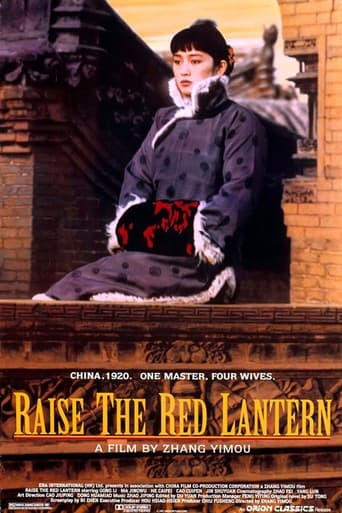lasttimeisaw
Chinese auteur Zhang Yimou's fourth feature, Venice's Silver Lion winner and an Oscar BEST FOREIGN LANGUAGE FILM nominee, RAISE THE RED LANTERN, first and foremost, emblazons Zhang's indubitable sense of form as a cinematic aesthete by curtailing the whole shebang within the perimeter of a palatial residence (the Qiao Family compound near Pingyao, Shanxi Province) in the Warlord Era China of the early 20th Century, and vetting women's tragic life immured inside a feudal prison with a fine-tooth comb.Songlian (Gong Li), a 19-year-old college-dropout, marries into the wealthy Chen Family as the fourth wife (or the third concubine), and soon is embroiled into the harem's backdoor maneuver, validated by the lantern-lightening ritual vouchsafed by Master Chen (Ma Jingwu) - whose face is never shown in close-up, a bold generalization pregnant with Zhang's tacit swipe at the draconian patriarchy's clutches - to indicate which wife he intends to spend the night with and is concomitant with privileges like sensual foot massage and preferential culinary options vested to the cherry-picked one.With the exception of Chen's first wife, the scraggly Yuru (Jin Shuyuan), who is long in the tooth and has become philosophical towards her long-gone heyday, the quotidian contest revolves around Songlian, Meishan (He Saifei), the third wife, a cosseted former Peking opera star who sub rosa engages in an illicit affair with the family doctor, and Zhuoyun (Cao Cuifen), the second wife, a Buddha-faced, scorpion-hearted figure, who befriends Songlian with an ulterior motive to exact. As the surrogate of audience, Songlian enters Chen's household with "those who know nothing fear nothing" assertiveness that we all obligatorily root for her ascendancy among the medieval hierarchy, but as she realizes before long, those backhanded plotting is nothing but futile attempt, those wives are merely disposable accessories of their husband, vessels of procreation. She can neither deign to Zhuoyun's total submission to this polygamous anomaly nor become rebellious enough like Meishan, who dares to cross that dangerous line to stake her claim as an individual being, in the event, assailed by the collective onslaught of guilt, despair, disillusion and shock in the wake of witnessing a brutal murder, she is no longer compos mentis. In the byplay, the friction between she and her mulish maid Yan'er (Kong Lin), who harbors a pipe dream of becoming her master's mistress and holds a none-too-subtle grudge over Songlian, is even more tragic because what adds insult to injury is the insuperable chasm caused by classism, that completely antagonizes those two girls of similar age, on the strength of false hope and mean-spirited vengeance. A high-octane Gong Li is par excellence to headline this sublimely arranged female-oriented melodrama, exhibiting a staggering disintegration of Songlian's headstrong persona through smoldering emotional shifts, and rounds out the show with a bang in the coda: business as usual in the family's fiefdom, only she has devolved into a living-ghost perennially and obliviously wandering the courtyard, seems to apprise her unwitting successor of a buried tragedy, which like as not will repeat again. Among the supporting players, He Saifei impresses with her stupendous opera posture and a friend-or-foe intrigue that occasions a precious if elusive sense of solidarity that is essential to the film's feminist slant; on the opposite of the gamut, veteran actress Cao Cuifen, intriguingly excels in exemplifying the artificiality of sororal rapport.It goes without saying that RAISE THE RED LANTERN owes its appreciable renown as much to its performers as those behind the camera, namely, the rigidly-framed, chromatically stunning cinematography from Zhao Fei and Yang Lun that falls in line with a unique color scheme out of Zhang's ingenious conception, and the aural pleasure engendered by the oriental strains masterly composed by Zhao Jiping along with shrill Chinese opera snippets, honing the trenchant strength of this benightedness-censuring, universally allegorical tale that judiciously scrutinizes womanhood in its dead center.
Lee Eisenberg
Zhang Yimou's Academy Award-nominated "Da hong deng long gao gao gua" ("Raise the Red Lantern" in English) is one of the many movies that sets up why China is like it is today. In this case, the focus is the plight of a woman in the Warlord Era. Songlian (Gong Li) is forced to become a concubine for a wealthy man. She is his fourth mistress. Each mistress lives in her own compound, and the lantern of his chosen mistress for the night gets lit. Tension is bound to arise, especially since not every mistress gets equal treatment.The movie is a look at the master's superficial world, and the pseudo-luxury that the mistresses enjoy. The rooms themselves may be colorful, but the compound itself is just as dismal as the mistresses' lives. The unusual blend of colors and music creates a movie like few others. You don't have to know all about China's history to understand what a fine piece of work this is. I recommend it.
Ruben Daniels
The biggest problem with Raise the Red Lantern is what happens to Songlian in the end. There's so much tension, interplay that builds up and there's the very frightening raising of the ot lanterns, so when the Freudian epilogue along with the new introduction is posed as if history endlessly repeats (which it certainly did not) it comes off as unconvincing. Taoist? Stoic? Nihilist? I'm not sure what Chinese women would make of this movie really, except as cinematic candy. And it sure shines on that level. The film is just totally beautiful and Yang Zhimou has a sublime way with lines and light. Still, this is a film trying to be about women directed by a man. It doesn't quite work.



